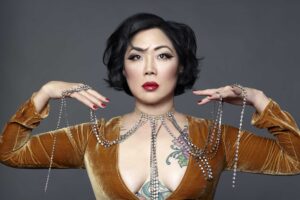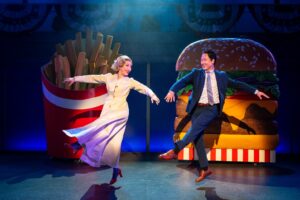When Joe Luther (COL ‘16) decided to come to Georgetown, he had many predictions about the future. Like many of his classmates, he was focused on making friends, excelling in his classes, and on his professional development. “What I really liked about Georgetown,” Luther said, “was that you have this really great campus…but you also have big city access, both for fun and professional opportunities.”
Of the seemingly endless opportunities that present themselves to new Georgetown students every year, Luther, who had acted only once before in his life in a sixth-grade adaptation of Shakespeare’s Twelfth Night, never expected that comedy would become a cornerstone of his Georgetown experience. Now the editor-in-chief of The Georgetown Heckler and the publicity director of the Georgetown Improv Association, Luther has certainly found a home in this niche of the Georgetown community.
Luther attributes his introduction to Georgetown’s comedy scene largely to luck. “When I came here as a freshman, I really had no idea what I wanted to get involved with,” he said. “I managed to get trapped in the performing arts section [during SAC Fair], saw improv there, and thought ‘Hey, why not give it a shot?’”
Like Luther, many of the the members of GU Improv began their improv careers only after stumbling upon Georgetown’s comedy scene. Of the nine active members of the group, only five had previous acting experience. For the majority of students in the group, the choice to audition for the troupe was a spur-of-the-moment decision, motivated by a random sighting of a flyer and irregular external confirmations of their humor. This scenario was the case for Thomas Moakley (SFS ‘17), who had no experience performing in an improv group before coming to Georgetown. “My friend from home kind of pushed me to audition for the improv team,” he said. “I kind of just saw the posters and decided to do it.”
Connor Rohan (COL ‘16), who transferred to Georgetown last year from George Mason, also found Georgetown improv in the same way. [Full disclosure: Connor Rohan is a Voice staff writer.] Rohan was first introduced to the improv world during the second semester of his freshman year by the George Mason Improv Association. “They did something called jams … which are like workshops where anyone can come and just have fun and do improv.”
For Rohan who now acts as the business manager of Georgetown’s troupe, the art came easily. “Some people try a sport and it just feels natural. That’s what improv is for me…The one thing that I knew for sure that I wanted to do when I got here was to try out for improv.”
Despite the slapdash way most of the troupe joined improv, becoming a member of GU Improv requires a large commitment. The group rehearses twice a week for a total of five hours. In addition, auditions are incredibly selective, even more so than those of many other performing arts groups. “At least 60 people auditioned this year for three slots,” according to Emlyn Crenshaw (COL ‘15). [Full Disclosure: Emlyn Crenshaw is a former Voice Staffer.]
Crenshaw’s decision to audition for improv came after numerous years as a child actor. “It’s not like I was super famous, but I was involved in professional shows.” During this time, Crenshaw fell in love with theater. But when she arrived at Georgetown, Crenshaw had to re-evaluate whether or not she would be able to enjoy her time within the collegiate theatrical world. Crenshaw’s reservations about pursuing theater were confirmed by her first experience with arts at Georgetown. Crenshaw received a part in a collaborative play with Gallaudet during her freshman year, but dropped out after the first rehearsal due to the heavy time commitment.
It was at this point where Crenshaw, still searching for an outlet for her creativity, saw a poster for GU Improv. Despite having only done improv once, when she was a child, Crenshaw decided to give it a chance, thinking that it might be the perfect medium to express herself. “Improv is kind of stupid,” Crenshaw said, looking back on how it had shaped her Georgetown career. “But it just became exactly what I was looking for. A really laid-back way to stay creatively engaged.”
***
Since it’s formation in 1995, then the Georgetown Players Improv Troupe, the Georgetown Improv Association, commonly known as GU Improv has been the face of comedy at Georgetown—sometimes literally. “A lot of people I’ve never met before, come up and say, ‘Oh, you’re on improv!’” Rohan said.
The group performs about once a month in Bulldog Alley, but despite the unconventional venue—the stage is usually a simple raised platform—GU Improv’s shows are popular among students. “We usually sell out or almost sell out the house for all of our shows,” Crenshaw said.
In addition to their monthly performances, the troupe also gets invited to collaborate with other student groups or bands quite often. Last year alone, the group performed at the South Asian Society ball and an event for East Campus Res Life, held a workshop for MBA students in Management Professor Rebecca Heino’s class, and hosted groups from Princeton, Ohio State, the University of Maryland, and George Mason in their 18th annual Improvfest. “We’ve managed to make a lot connections,” Crenshaw said, “which I think is really cool.”
Even though GU Improv thrives on-campus, comedy and the performing arts exist on the periphery of Georgetown’s culture. “When people think Georgetown, they think of a humorless, pre-professional world,” Rohan said. “Which it is, a lot of the time.” But for the students in the improv community, Georgetown’s environment is nurturing toward the perfection of their art. “You can’t get comedic material from comedy,” Rohan said. “You get comedic material from the rest of the world. And this school is mostly the rest of the world.”
Likewise, the small size of the improv community itself has proven to be a great benefit to those within the troupe. The eight students who are currently members of GU Improv only make up 0.1 percent of the undergraduate population. “You really get immersed in the craft,” Rohan said. “You can foment within this tiny community.”
“We’re a very tight-knit group,” Crenshaw said. “If we had a 30-person team it wouldn’t be possible at all really to do the type of shows that we do … When I step out on stage with Connor [Rohan], I don’t know what’s going to happen, but … I kind of know the things he would say, and he kind of knows the things I would say and what type of characters I would gravitate to. We really have to be able to operate on that level of familiarity.”
***
Despite widespread support from the student population, the creativity of GU Improv is not entirely uninhibited. GU Improv, much like most other extracurricular groups on campus, must go through a complex bureaucratic process to obtain funding. This process, for GU Improv and other performing arts groups at Georgetown, is overseen by the Performing Arts Advisory Council.
“PAAC was formed along with several other advisory boards, including the Media Board and the Center for Social Justice … about 30 years ago, as a direct response to the lawsuit that the Gay Student Association brought against Georgetown University,” said Ron Lignelli, administrative director of the Department of Performing Arts. The GSA brought the lawsuit forward in 1981 because they did not have equal access to funding and campus spaces. Following the successful lawsuit, the University decided the best way to assure student groups equal access to benefits was to create these additional advisory boards.
At the time of its founding, PAAC only oversaw five different performing arts groups, which were previously part of the Student Activities Commission. The board, which is comprised of four faculty members and five students, is now in charge of 18 groups, ranging from acappella, dance, and theater groups, and GU Improv. The board audits and assess each of these group’s financial needs and is the source of a majority of each group’s capital.
Currently, each group under PAAC must submit their budgets in February to be reviewed by the board in March. “In the performing arts, the budgets are pretty standard, as the groups tend to do the same things each year,” Lignelli said. “Improv will do the same number of shows, Mask and Bauble will do the same number of shows … we know when all of the concerts are, we’ve already booked all the halls, everything gets confirmed.”
There is also a supplementary procedure in place for when groups need access to additional funding for something that may not be in their approved budget, such as unanticipated travel expenses. In order to acquire funding for these expenses, groups must fill out a form that details the expenses that will accompany the proposal. If the proposal is for less than $357 it can be approved directly by Lignelli, unless it involves travel. Otherwise, it must be reviewed by the board, who generally only meet every three to four weeks.
Additionally, groups may pay for some expenses with their gift fund, which holds any donations the group receives from students’ parents, alumni, other students, or money they make while performing off-campus. Often, PAAC asks groups to draw funds from their gift accounts to supplement whatever money they might receive.
This system is a cause for concern for the members of GU Improv, who sometimes find that its inefficiency stymies their capacity to grow as a performance group. PAAC approves budgets based on its judgement of how much is required to run the organization in its current state. Thus, it allocates groups with relatively low overhead costs with less funding than other groups.
The repercussion of this system is that GU Improv, which practices in random open rooms they find in Walsh and performs in a space that costs the University very little money to maintain, never has direct access their revenue from on-campus performances. “We pull in about $5,000 a year,” Rohan said, “and we only get a budget of $2,500.”
The cost factor makes it difficult for GU Improv to grow as a team and for its members to develop as individual artists because their budget lacks any room for advancement opportunities. “We’ve found that travelling really helps us as a team,” Crenshaw said. “When you are exposed to a lot of different improv teams, you get to understand your team better … you develop an understanding of your strengths and weaknesses.”
Last semester, when the team proposed their new budget, they tried to reallocate money they were not using within their budget to cover potential travel opportunities, but these line items were declined by PAAC. “We were essentially told, ‘Look, the stated purpose of your organization is not for travel, it’s for performances here on campus,’” Crenshaw said. If the group wanted to have more funds for traveling, and other opportunities that would benefit their group, they would have to change their mission statement.
Granted, changing a mission statement is not too difficult and the members of GU Improv are looking into doing so, but Crenshaw worries that there is a misconception within the PAAC board and other administrators that GU Improv is attempting to shift its overall focus. “We don’t want to change our mission to be primarily about travel, because shows on campus are our main deal and always will be,” Crenshaw said, “But travel is important to us too.”
Ultimately, though, despite the disagreements that have come up between the two parties, GU Improv is generally happy to be a member of PAAC. “They provide us with a lot of necessary support, administratively,” Moakley said. “So that we’re not totally on our own.”
“The fact that PAAC works in the way it does keeps us in existence,” Crenshaw said. “Our team is so small and it’s character can fluctuate so much, that unless we had PAAC as a controlling entity, we could so easily dissolve in a year of lazy, sloppy leadership.”
***
In its almost two decades of existence, the Georgetown University Improv Association has produced its fair share of impressive alumni, including Mike Birbiglia (COL ‘00), Nick Kroll (COL ‘01), John Mulaney (COL ‘04), and many other stand-up comedians, actors, and writers such as Jim Gaffigan (MSB’88). And while a career in comedy doesn’t appear to be on the horizon for most of its members, only two of whom plan to pursue a career in comedy, they all recognize that the potential foundations of one are still present.
“Just the knowledge that [GU Improv] can be the first step to a career in comedy is massively important.” Luther said. “But, if this is the first step, then I’m still tying my shoes.”
The benefits of improv stretch even beyond the performing arts. “Improv is my home at Georgetown, really,” Crenshaw said. “It’s where I feel the most comfortable and something I can always look forward too…it’s such a relief to be a part of a group like that.”
“I can’t tell you the good it’s done for me,” Rohan said, “for me, it’s truly been a light, within the darkness.”






If Jim Gaffigan graduated in ’88, I’m pretty sure he wasn’t in Improv if it was founded in 1995…
@Barack You are correct! Gaffigan was never on the team.